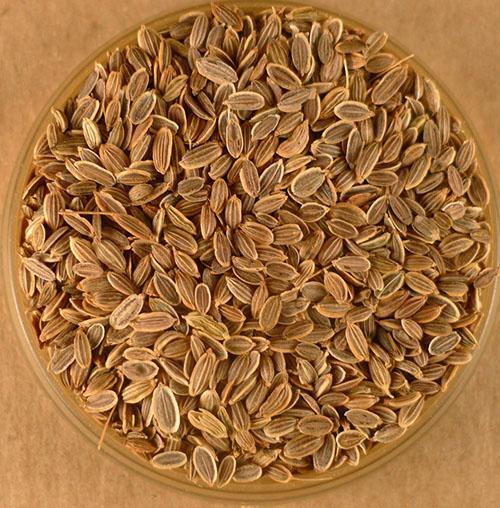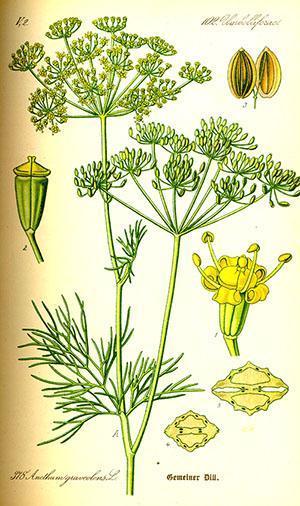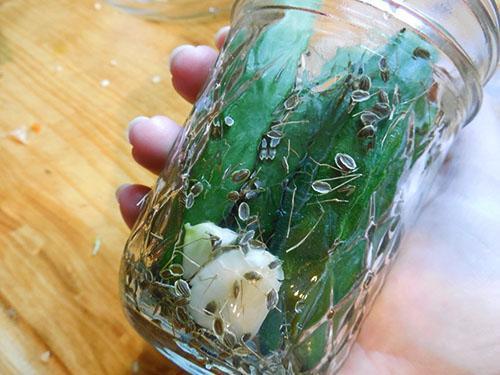We use the medicinal properties of dill seeds
 Not a single summer cottage is complete without a dill bed. The greenery of this culture is loved by many housewives. At the same time, complaints are often heard from gardeners that, without having time to pamper summer residents with fragrant foliage, dill has released flower stalks. After yellow inconspicuous flowers fall from large umbrellas in July or August, on dill seeds appear. It is them that are most appreciated in the plant by both official medicine and traditional healers.
Not a single summer cottage is complete without a dill bed. The greenery of this culture is loved by many housewives. At the same time, complaints are often heard from gardeners that, without having time to pamper summer residents with fragrant foliage, dill has released flower stalks. After yellow inconspicuous flowers fall from large umbrellas in July or August, on dill seeds appear. It is them that are most appreciated in the plant by both official medicine and traditional healers.
And although in cooking, oval flattened seeds are most often used only in baking and conservation, this is a true storehouse of useful substances. What are the beneficial properties of dill seeds, when is it better to harvest them, and how to use them?
Read also the article: rhubarb benefit and harm to the human body!
What are the benefits of dill seeds?
All parts of the dill plant, from the rhizomes to the stem, are rich in nutrients. The seeds of the culture contain record amounts of macro- and microelements, active substances, essential acids and essential oils.

- 10.8 g potassium;
- 4.4 g phosphorus;
- 9.6 g calcium;
- 0.65 g of sodium, as well as manganese, zinc, copper, iron, molybdenum and other equally valuable trace elements.
During ripening, valued in folk medicine, dill seeds accumulate not only useful elements, proteins and vitamins, but also flavonoids and phytoncides. In the aerial part of the plant and its roots, the oil content does not exceed 3.8%. Fruits are 14.65% of this indispensable product in the food, pharmaceutical and soap industry, than dill seeds are most useful.
Dill oil is 65.5% palmitic acid, 25.3% petroselinic acid and 6% linoleic acid. The biochemical composition of the garden crop and the beneficial properties of dill seeds have been studied relatively recently. However, many thousands of years ago, representatives of ancient civilizations had a genuine interest in the plant. This was facilitated by its unpretentiousness and its wide distribution from the North of Europe to the Mediterranean.
Dill seeds in folk medicine
 Even in ancient Rome, dill was considered a plant that can relieve headaches, awaken interest in life and the opposite sex. Perhaps that is why the young man could present a wreath or a bouquet of stems crowned with umbrella-shaped inflorescences to the girl he liked. Chapters on dill are found in the scientific works of Dioscorides and Galen. Dioscorides, in particular, proposed dill as a medicine for eye diseases. And the representative of the Eastern scientific school Avicenna considered fragrant herbs and seeds to be an indispensable remedy for a variety of ailments. What are dill seeds useful for?
Even in ancient Rome, dill was considered a plant that can relieve headaches, awaken interest in life and the opposite sex. Perhaps that is why the young man could present a wreath or a bouquet of stems crowned with umbrella-shaped inflorescences to the girl he liked. Chapters on dill are found in the scientific works of Dioscorides and Galen. Dioscorides, in particular, proposed dill as a medicine for eye diseases. And the representative of the Eastern scientific school Avicenna considered fragrant herbs and seeds to be an indispensable remedy for a variety of ailments. What are dill seeds useful for?
It was in his treatises that a means for increasing lactation for nurses was first mentioned. This scientist owns the authorship of the means, now referred to as traditional medicine, where the seeds relieve hiccups and heaviness in the stomach. For stomach pains, Avicenna suggested using enemas with dill decoction. Apply the steamed seeds and leaves of the plant to the hemorrhoids to relieve pain and prevent bleeding. The soothing and tonic properties of dill seed and herbs were also noted by this learned man of antiquity.
Medieval physicians largely followed the advice of the ancients and used dill to heal patients with intestinal, inflammatory, skin and eye diseases. Today, when the composition of plant raw materials has been well studied, the area of application and useful properties of dill seed has only expanded, and it is possible to collect medicinal fruits on a personal plot.
How to collect dill seeds?
 To use dill seeds for medicinal purposes, it is important to carefully collect and preserve them. The easiest way to do this is if:
To use dill seeds for medicinal purposes, it is important to carefully collect and preserve them. The easiest way to do this is if:
- at the beginning of seed ripening, cut off the tops of the stems along with the umbrellas;
- dip fresh raw materials into paper bags with umbrellas to the bottom;
- fix the bags on the stems with thread and elastic;
- hang the bundles for a week in a ventilated dry room.
During this period, the seeds dry out, they ripen, and they naturally fall to the bottom of the bag.
To preserve all the beneficial properties of dill seeds, they are stored under a lid in a sealed glass or ceramic container. When drying and storing, it is important not to allow seeds to stay in a brightly lit place or damp.
Before collecting dill seeds, you need to make sure that they are not infested with pests, there are no signs of mold or other diseases on the umbrellas. If the raw materials are stored correctly, they will not lose their quality for up to five years. At home, dill seeds are a simple and effective remedy for relieving gas and stimulating digestion. Diuretic and anti-inflammatory decoctions are prepared from the seeds, lotions are made for abscesses on the skin and eye irritation.
But for all the medicinal properties, dill seeds also have contraindications, so it can be dangerous to get involved in self-medication in this case.
Useful properties of dill seeds
 Essential oils and phytoncides, vitamins contained in seeds. Proteins and trace elements have a beneficial effect on many systems and internal organs of a person. The beneficial properties of dill seed are used for:
Essential oils and phytoncides, vitamins contained in seeds. Proteins and trace elements have a beneficial effect on many systems and internal organs of a person. The beneficial properties of dill seed are used for:
- activation of digestive processes and bile production;
- disinfection and removal of inflammation during purulent processes on the skin, in the urogenital area and respiratory organs;
- normalization of pressure;
- improving the work of the cardiovascular system;
- relieving fatigue and nervous excitement.
Today, dill seeds, recognized by folk medicine, are used by official science. Anetine, a substance that helps relieve spasms in case of heart pain, attacks of angina pectoris and colic in patients with gastritis, has been isolated from plant materials.
And decoctions and infusions of crushed seeds are recommended as a supportive agent for the treatment of the initial stages of hypertension. Thanks to the active substances contained in dill, herbal preparations have a beneficial effect on the condition of the walls of blood vessels, preventing the development of atherosclerosis and coronary insufficiency. Why are dill seeds still useful? The positive effect of dill seeds on the genitourinary sphere, as well as the state of the liver and the functioning of the intestines, is confirmed, as described by Avicenna. Dill tea from the seeds of this plant is effective for colitis, heaviness in the stomach and increased gas production.
To prepare an infusion for 4 tablespoons of crushed seeds, take 500 ml of hot water. The product is kept for 60 minutes, after which it is filtered and drunk in the morning and evening, 100–150 ml each. For constipation, the infusion of dill seeds before meals is taken three times a day, 80-100 ml. Due to its anti-spasmodic properties, dill seeds in a decoction can relieve regular stomach pains.
The traditional remedy for infant colic is dill water, which is easy to make at home from dried dill or fennel seeds.
It is this plant that is now part of the pharmacy collection. Infusion for children is prepared from a spoonful of dry seeds and a glass of hot boiled water. The baby is given a teaspoon before each feeding.At the same time, water should not be stored longer than a day.
 As a natural diuretic, an aqueous infusion of dill seeds is used, which are crushed or ground before use. 250 ml of boiling water goes to a tablespoon of fruit. After a 15-minute infusion, the drink is filtered and cooled. Drink infusion should be 50 ml up to 6 times a day or three times 100 ml before eating.
As a natural diuretic, an aqueous infusion of dill seeds is used, which are crushed or ground before use. 250 ml of boiling water goes to a tablespoon of fruit. After a 15-minute infusion, the drink is filtered and cooled. Drink infusion should be 50 ml up to 6 times a day or three times 100 ml before eating.
The beneficial properties of dill seed in this case mildly anesthetize, relieve inflammation and spasms in nephritis, urolithiasis and other diseases of the kidneys and ureters.
An infusion of 2 tablespoons of seeds and a glass of water will help to cope with bedwetting. The tool is infused in a thermos for 12 hours, after which it is taken in 80 ml in the morning. The course of treatment is 10 days. Many generations of women have tested on themselves how useful dill seeds are for increasing milk production. The effectiveness of the product is also confirmed by official medicine, which approved the inclusion of dill seed in the composition of specialized teas to activate lactation. Young mothers should drink the infusion half a glass twice a day.
 For anemia, nervous overexcitation, or insomnia, dill seeds boiled in milk are useful. To do this, take a glass of milk on a tablespoon of fruit and keep the mixture on low heat for 10 minutes. When the liquid has cooled, it is filtered and drunk three times a day. The same remedy has a beneficial effect on the condition of patients with tuberculosis, people suffering from obsessive cough, bronchitis and pharyngitis.
For anemia, nervous overexcitation, or insomnia, dill seeds boiled in milk are useful. To do this, take a glass of milk on a tablespoon of fruit and keep the mixture on low heat for 10 minutes. When the liquid has cooled, it is filtered and drunk three times a day. The same remedy has a beneficial effect on the condition of patients with tuberculosis, people suffering from obsessive cough, bronchitis and pharyngitis.
If the patient is lactose intolerant, a spoonful of crushed seeds will help relieve nervous tension, calm down and sleep well. The powder is taken three times daily before meals.
A fresh decoction of dill seed is used for conjunctivitis, discomfort and fatigue of the organs of vision. In this case, gauze napkins are impregnated with the agent and warm compresses are made for 10 minutes. A strong infusion can also be used to wash the eyes.
Contraindications when taking dill seeds
 Due to its medicinal properties and availability in official and folk medicine, dill seeds are highly valued and widely used. Decoctions, powders and infusions from this plant material can help in the treatment of many serious diseases, and they act mildly and with little or no negative consequences or side effects.
Due to its medicinal properties and availability in official and folk medicine, dill seeds are highly valued and widely used. Decoctions, powders and infusions from this plant material can help in the treatment of many serious diseases, and they act mildly and with little or no negative consequences or side effects.
But no matter how useful dill seeds are, they can be used for medicinal purposes only after consulting a specialist, with the confidence that nothing threatens the body. In addition to individual intolerance to certain substances in the composition of dill and its seeds, there are other contraindications that can outweigh the beneficial properties of dill seed.
With thoughtlessly large doses, dill can dilate blood vessels, which negatively affects the well-being of people with low blood pressure.
In such patients, the dill seed preparation can cause weakness, visual impairment, fainting and muscle weakness. If you cancel the reception of a decoction or infusion, then the condition will quickly return to normal. But for pregnant women and people suffering from intestinal atony, it is better to refrain from using dill seeds.